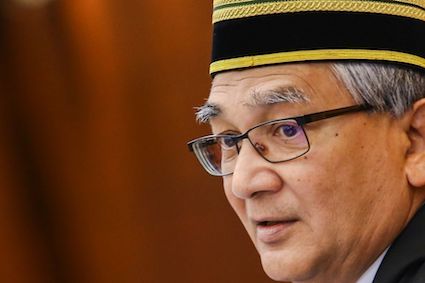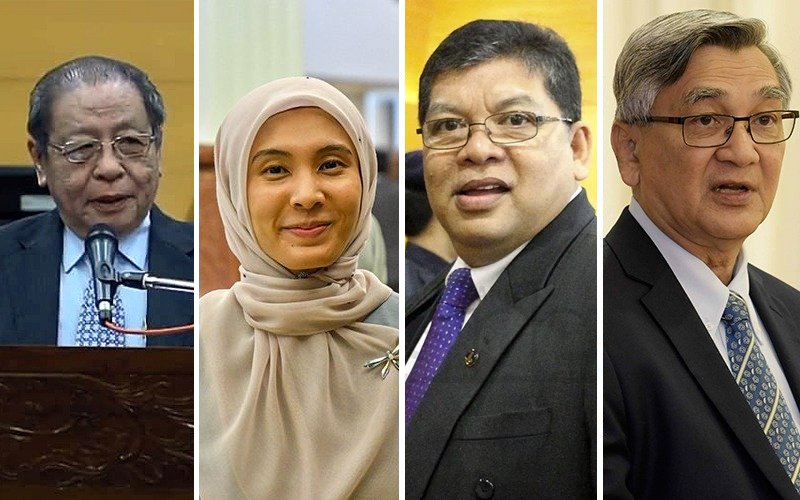Bid to replace speaker brings back 2018 wheeling and dealing

(FMT) – A key person involved in discussions to appoint the Dewan Rakyat speaker in the wake of Pakatan Harapan’s (PH) election victory in 2018 has questioned the coalition’s support for Mohamad Ariff Md Yusof following Prime Minister Muhyiddin Yassin’s motion to replace him along with his deputy.
The person who wished to remain anonymous told FMT that PH leaders had been more keen to appoint one of their own MPs as speaker, but were met with “technical dead ends” at every turn.
According to the source, the coalition initially promoted Anwar Ibrahim’s daughter, Nurul Izzah Anwar, and DAP stalwart Lim Kit Siang for the job.
“But they could not be appointed as each had a close relative in the new Cabinet.”
Nurul Izzah’s mother is Dr Wan Azizah Wan Ismail, who was PH’s deputy prime minister, while Kit Siang’s son Lim Guan Eng was the finance minister.
The source said it was at this juncture that Johari’s name was actively mooted.
“This was despite a readily available candidate like Ariff, who was seen as more qualified for the post, even if he would not have fulfilled PH’s election manifesto,” it added.
PH in its manifesto had said that the speaker would be chosen from among MPs. The argument was that a speaker from among their own kind would ensure a sense of responsibility among fellow lawmakers.
“As a former appeals court judge, Ariff had some semblance of non-partisanship. Yet he was not on PH’s list of candidates, and strangely there was a strong zeal to toe the manifesto when it comes to this issue,” said the individual, a frequent participant in discussions for key appointments under the previous government.
The nomination of Johari for the speaker’s job drew strong support from Amanah and DAP despite the fact that Ariff had also been Amanah’s legal adviser.
“But the party still thought it fit to support Johari as speaker,” the source told FMT.
However, it drew protest from civil societies who saw Johari as a vestige of old Umno politics due to his past involvement in BTN, the Barisan Nasional (BN)-era National Civic Bureau which was accused of conducting “brainwashing” programmes on civil servants.
FMT has verified the claim with several key players in the 2018 negotiations for a new speaker under the PH government which was just weeks old at the time.

‘Catastrophe in Kedah’
However, it was not the protests that led to Johari being dropped as PH’s candidate for speaker.
It soon emerged that his ascent to the post could lead to a “political catastrophe” in Kedah, where he is MP for Sungai Petani as well as the Gurun assemblyman.
Becoming the speaker would have seen him giving up his state constituency as demanded by law.
“That would have instantly brought down the PH government in Kedah, which actually had a tie of 18 seats with BN and PAS combined.
“Since PH had gone to the election as a coalition, unlike the two others, they got to form the government,” the source said.
In the May 2018 election, PAS won 15 state seats while BN won three, which together comprised 50% of the 36-seat Kedah assembly.
The Malay-based parties did not forge a formal political cooperation until the following year.
Ultimately Mahathir’s choice
Yesterday, PH spoke out against the motion to remove Ariff and his deputy, DAP’s Nga Kor Ming, from helming the Dewan Rakyat.
“The speaker has proven that institutional reform efforts which started after the 14th general election have borne fruit and must be continued,” it said in a joint statement by PKR, DAP and Amanah.
Critics have also questioned the move despite its legality, saying it could be an attempt to prevent motions unfavourable to the government.
It also precedes what is expected to be a more conventional Dewan Rakyat session this month, the first since the one-day ceremonial sitting in May which angered opposition parties with its brevity.
The source questioned the current support for Ariff by PKR, DAP and Amanah given their initial resistance to his candidacy and inclination to appoint “one of their own” to the post.
It is understood that despite his past judgments which reflected his political neutrality, there was resistance from PH politicians who wanted a sitting MP for the job.
“We all know that Dr Mahathir Mohamad was not a fan of the Buku Harapan,” the source added, referring to PH’s manifesto.
“And so, Mahathir was adamant that Ariff be appointed instead, breaking away from PH. It was felt that although this violated the manifesto, Ariff was a better option than any of the candidates PH wanted.
“In the end, Mahathir’s choice held sway, and that silenced the PH politicians.”

